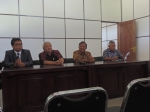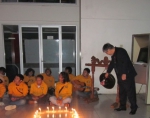SAPPK ITB Guest Lecture: History of Energy Security and Climate Change in Indonesia

BANDUNG, itb.ac.id - The School of Architecture, Planning and Policy Development (SAPPK) ITB held a guess lecture to begin the 2021/2022 Academic Year on Friday (3/9/2021). The guest lecture entitled "The History and Future of Energy Security and Climate Change in Indonesia". Aswin Indraprastha, Ph.D., and Adiwan Fahlan Aritenang, Ph.D., were moderated in this lecture, inviting Prof. Budy P Resosudarmo from the Australian National University as the keynote speaker.
The public lecture began with remarks from Dr. Sri Maryati, the Dean of SAPPK ITB. "With the task of carrying out research, education, and community service in the field of design planning and policy development in the environment, energy, and climate change, of course, they are very closely related. Today we present a prominent speaker who has experience in this field, and I believe we will gain advantageous knowledge," she said
Opening the presentation, Prof. Budy said that the discussions focused on the core issues, namely energy security and climate change, and the overall approach to these problems. "One way to look at it is from a historical point of view," he said.
He mentioned that Indonesia has a diversity of resources, both gas, oil, and commodities. The diversity of resources in Indonesia is crucial, especially in terms of the economy. "During the colonial period, the Dutch wanted to extract resources in Indonesia by conducting a trade monopoly and expropriation of territory, especially in Java and Sumatra. After independence, during the Soekarno era, the Indonesian economy experienced a decline," explained Prof. Budy.
He continued, "There was an acceleration in the country's growth during the Soeharto era after the issuance of regulations on resources, investment, forestry, and mining. Within five years, there was a 50 percent increase in resources in Indonesia. This strategy has succeeded in building Indonesia to reduce the poverty rate by almost 50 percent." However, the strategy resulted in the exploitation of resources. Environmental issues were also not given much attention.
Then, in the era of Habibie, Gus Dur, and Megawati, Indonesia experienced a financial recovery. The President reissued regulations on forests in the period of Susilo Bambang Yudhoyono. "In the SBY era, commodity prices, especially mining and plantations rose. Coal mining is starting to open up, and its production is increasing every year. Indonesia is even included in the top 5 coal exporting countries even though the raw materials are not as many as other largest exporting countries," said Prof. Budy.
As a result of excessive land use from these activities, Indonesia has become one of the largest carbon dioxide emitting countries globally. Still, in the same era, SBY prepared a strategy for dealing with carbon emissions. Then in 2014, it changed to the Jokowi era, whose Nawa Cita prioritized infrastructure development. Along with increasing economic growth, so does the need for energy used. Unfortunately, Indonesia has not been able to adopt more energy-efficient technologies.
"Environmental conditions are still not being considered, even though the use of coal has grown and is the main driver of carbon dioxide emissions. We need to think about now that our resources and energy are starting to decrease in number. Are there other resources that can boost our economy? It will be challenging to encourage the economy with the existing natural resources," explained Prof. Budy.
In terms of development, Indonesia can develop because it has investment value from existing wealth. However, it is necessary to pay attention to how to overcome the energy required. "The consequence of the current environmental conditions is that there is not enough energy. Can the implementation of policies to secure energy support property alleviation?" Prof. Budy threw a rhetorical question.
He mentioned that in the future, there are two possibilities to secure energy to support development. First, energy integrity, which connects energy systems and developing an energy market. Second, renewable energy, especially solar and water power extensively. "Those two things can be done, although it is not known for certain whether they support the economy and alleviate poverty or not," said Prof. Budy.
At the end of the presentation, Prof. Budy emphasized that Indonesia needs to control and secure energy by controlling carbon emissions. "The bigger goal, one of which is to eradicate poverty," he concluded.
Reporter: Zahra Annisa Fitri (Region and City Planning, 2019)

scan for download






